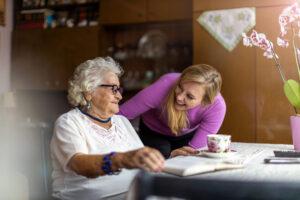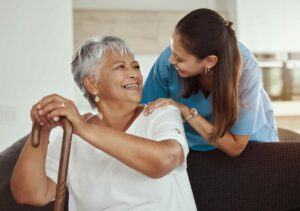Falls and associated injuries are more likely to occur in older people. Research has shown that one in three people aged over 65 years have a fall during any given year. 10% of those people will have multiple falls.[1] Further, falls are a leading cause of injury, hospitalisation, and death in older people.[2] At Home Care Assistance, we know the devastating effect falls can have on an older person, so we have put together this blog to help you understand why falls are more likely to happen as well as our top 10 tips to help prevent falls from happening in the home.
Why do Older People Have Falls?
As we age, our bodies change. Some of those changes can lead to an increased likelihood of falls. These changes include:
- Weaker muscles that may make tripping and falling more likely.
- Poorer eyesight making it more difficult to see obstacles, especially in low light or with sudden changes to light.
- Slower reaction times.
- Poor balance – this can result in unsteadiness.
- Other health problems such as dementia, blood pressure issues, or poor sensation in the feet.
- The use of certain medications can also make falls more likely due to their side effects.
- Safety or trip hazards in the home.
Tips for Preventing Falls
While not all risk factors for falls can be prevented, there are things that can be done to help prevent falls. Our top 10 tips for preventing falls are:
- Maintaining physical activity. Staying active helps to keep muscles healthy and strong which can prevent falls. Our Care Professionals from Home Care Assistance can help you or your loved one undertake your exercise program safely. If not currently active, it is important to see a GP before beginning an exercise program.
- Having eyes and ears checked. Seeing and hearing well can help prevent falls. This also then includes wearing any prescribed glasses or hearing aids.
- Remove any trip hazards around the house.
- Installing handrails and non-slip mats in areas such as the shower or toilet.
- Wear good fitting and comfortable shoes with adequate grip.
- Use night lights around the house so if you get up during the night you can see where you are going.
- Take medications as prescribed and notify the GP if they cause dizziness. If adherence to medication regimes is challenging, then your local pharmacist or your Care Professional from Home Care Assistance can help with this.
- Maintain a healthy diet and drink plenty of water. Eating and drinking well can help avoid dizziness.
- Use a mobility aid to help you move around. An aid such as a walker or cane can help you move around safely if your balance is poor.
- Get up slowly if you have been sitting or laying down. This helps your body to adjust to the change of position.
The likelihood of falls increases significantly and is more likely to lead to injuries, and longer recovery times as we get older. While it may not be possible to remove all risks of falls, the risks can be significantly reduced by implementing these tips. However, if you or your loved one is still experiencing falls, or is at risk of falls, despite the implementation of these tips, then you might need a higher level of assistance. At Home Care Assistance, our Care professionals are trained in fall prevention and management to offer you peace of mind.
Support of an in-home care agency like Home Care Assistance, can bring enormous benefit and comfort to your quality of life while living independently at home. Home Care Assistance has viable solutions when it comes to supporting independent living. For more information, get in touch with a Home Care Assistance near me today.
[1] https://www.health.vic.gov.au/your-health-report-of-the-chief-health-officer-victoria-2018/injury-prevention/falls-prevention
As a leading age care provider, Home Care Assistance offers tailored in-home care services for older Australians, enabling them to live happier and healthier lives in the comfort of their own homes.
We offer private and government subsidised Care Packages and have office locations that are a registered NDIS provider. Our Care Workers undergo extensive training in order to deliver unmatched in-home aged care services where people can continue ageing in place. We are proud ambassadors of the My Aged Care government funded aged care program, enabling Australians to successfully navigate the process and gain approval for in-home care support packages. Home Care Assistance offers hourly care, specialised care, Alzheimer’s and Dementia care, hospital to home care, and 24 hour in home care.













